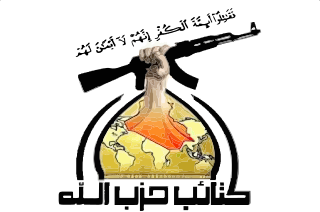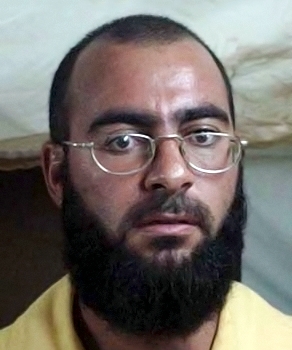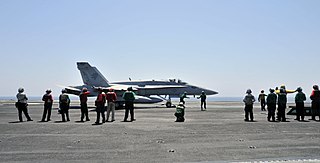Related Research Articles
Ali Moussa Al-Shawakh, known by his kunya Abu Luqman, Abu Ayyub al-Ansari or Ali al-Hamoud, was a Syrian man and the Islamic State of Iraq and the Levant governor of Raqqa, Syria as of July 2015. He used to be governor of Aleppo province.

Kata'ib Hezbollah —or the Hezbollah Brigades—is a radical Iraqi Shiite paramilitary group which is part of the Popular Mobilization Forces, staffing the 45th, 46th, and 47th Brigades. During the Iraq War (2003–11), the group fought against Coalition forces. It has been active in the War in Iraq (2013–2017) and the Syrian civil war (2011–present). The group was commanded by Abu Mahdi al-Muhandis until he was killed in a US drone attack in 2020. Thereafter, he was replaced by Abdul Aziz al-Muhammadawi, as the new leader of the Popular Mobilization Forces (PMF). KH seeks to establish an Iran-aligned government in Iraq, expel American forces from the country, and advance the regional and international interests of Iran in Iraq and the region. The group is responsible for killing hundreds of U.S. soldiers and takes a central part in carrying out attacks against U.S. targets in Iraq and acts as part of the Axis of Resistance. Kata'ib Hezbollah is directly subordinate to IRGC's Quds Force and operates under its instructions and guidance.

Ibrahim Awad Ibrahim al-Badri, commonly known by his nom de guerreAbu Bakr al-Baghdadi, was an Iraqi militant who was the first caliph of the Islamic State (IS) from 2014 until his death.

The Islamic State of Iraq, previously referred to as al-Qaeda in Iraq, is a militant Salafist jihadist group that aimed to establish an Islamic state in Sunni, Arab-majority areas of Iraq during the Iraq War and later in Syria during the Syrian Civil War.

Tarkhan Tayumurazovich Batirashvili, known by his nom de guerreAbu Omar al-Shishani or Omar al-Shishani, was a Georgian-Chechen jihadist who served as a commander for the Islamic State, and was previously a sergeant in the Georgian Army.

In response to rapid territorial gains made by the Islamic State during its 2014 Northern Iraq offensives, universally condemned executions, human rights abuses and the fear of further spillovers of the Syrian Civil War, many states began to intervene against it in both the Syrian Civil War and the War in Iraq (2013–2017). These efforts are called the War against the Islamic State, or the War against ISIS. In later years, there were also minor interventions by some states against IS-affiliated groups in Nigeria and Libya. All these efforts significantly degraded the Islamic State's capabilities by around 2019-2020. While moderate fighting continues in Syria, as of 2023, ISIS has been contained to a manageably small area and force capability.

The departure of US troops from Iraq in 2011 ended the period of occupation that had begun with the U.S.-led invasion in March 2003. The time since U.S. withdrawal has been marked by a renewed Iraqi insurgency and by a spillover of the Syrian civil war into Iraq. By 2013, the insurgency escalated into a renewed war, the central government of Iraq being opposed by ISIL and various factions, primarily radical Sunni forces during the early phase of the conflict. The war ended in 2017 with an Iraqi government and allied victory, however ISIL continues a low-intensity insurgency in remote parts of the country.

Muhsin al-Fadhli was an alleged senior leader of Khorasan, an offshoot of the al-Nusra Front, a branch of al-Qaeda.

On 15 June 2014, U.S. President Barack Obama ordered United States forces to be dispatched in response to the Northern Iraq offensive of the Islamic State (IS) as part of Operation Inherent Resolve. At the invitation of the Iraqi government, American troops went to assess Iraqi forces and the threat posed by ISIL.

Abd al-Rahman Mustafa al-Qaduli, better known as Abu Ali al-Anbari, was the governor for territories held by the Islamic State of Iraq and the Levant (ISIL) in Syria. Considered the ISIL second-in-command, he was viewed as a potential successor of ISIL leader Abu Bakr al-Baghdadi.

Adnan Latif Hamid al-Suwaydawi al-Dulaymi, also known by his noms de guerre Abu Muhannad al-Suwaydawi, Abu Abdul Salem, and Haji Dawūd was a top commander in the Islamic State of Iraq and the Levant (ISIL) and the former head of its Military Council.
Tariq bin al-Tahar bin al-Falih al-'Awni al-Harzi, also known as Abu Umar al-Tunisi, was a Tunisian man and senior leader of the Islamic State.

Jamal Ja'far Muhammad Ali Al Ibrahim, known by the kunyaAbu Mahdi al-Muhandis was an Iranian-Iraqi commander of the Popular Mobilization Forces (PMF). At the time of his death, he was deputy chief of the PMF and regarded as one of Iraq’s most powerful men.

Wissam Najm Abd Zayd al-Zubaydi, better known by his noms de guerre Abu Nabil al-Anbari, Abul Mughirah al-Qahtani or Abu Yazan al-Humairi was a commander in the Islamic State of Iraq and the Levant (ISIL) and the leader of its Libyan branch. Al-Anbari was killed by a US military airstrike on 13 November 2015.
In early 2014, the jihadist group Islamic State of Iraq and the Levant captured extensive territory in Western Iraq in the Anbar campaign, while counter-offensives against it were mounted in Syria. Raqqa in Syria became its headquarters. The Wall Street Journal estimated that eight million people lived under its control in the two countries.
This article contains a timeline of events from January 2015 to December 2015 related to the Islamic State of Iraq and the Levant (ISIL/ISIS). This article contains information about events committed by or on behalf of the Islamic State, as well as events performed by groups who oppose them.
Tarad Mohammad al-Jarba, better known by his kunya Abu Muhammad al-Shimali, was an Iraqi-born citizen of Saudi Arabia and a senior leader of the Islamic State of Iraq and the Levant (ISIL).
Faysal Ahmad Bin 'Ali al-Zahrani is a Saudi Arabian man and senior oil official for the Islamic State.

The US intervention in the Syrian civil war is the United States-led support of Syrian opposition and the Federation of Northern Syria during the course of the Syrian Civil War and active military involvement led by the United States and its allies — the militaries of the United Kingdom, France, Jordan, Turkey, Canada, Australia and more — against the Islamic State of Iraq and the Levant (ISIL) and al-Nusra Front since 2014. Since early 2017, the U.S. and other Coalition partners have also targeted the Syrian government and its allies via airstrikes and aircraft shoot-downs.
References
- ↑ al-Hashimi, Hisham (9 July 2014). "Revealed: the Islamic State 'cabinet', from finance minister to suicide bomb deployer". Telegraph . Telegraph Media Group Limited . Retrieved 19 December 2019.
- ↑ "Counter Terrorism Designations". U.S. Department of Treasury . United States Government. 29 September 2015. Retrieved 19 December 2019.
- ↑ "Treasury Sanctions Major Islamic State of Iraq and the Levant Leaders, Financial Figures, Facilitators, and Supporters". U.S. Department of Treasury . United States Government. 29 September 2015. Retrieved 19 December 2019.
- ↑ Adamczyk, Ed (11 December 2015). "Islamic State finance chief killed in airstrike". UPI . Retrieved 19 December 2019.
- ↑ Roggio, Bill (11 December 2015). "US military fails to 'decimate' Islamic State leadership despite thousands of airstrikes". The Long War Journal . Public Multimedia Inc. Retrieved 19 December 2019.
- ↑ Warren, Steve (10 December 2015). "Department of Defense Press Briefing by Col. Warren via Teleconference from Baghdad, Iraq". U.S. Department of Defense . Archived from the original on 22 January 2016. Retrieved 19 December 2019.
- ↑ "Islamic State finance chief 'killed in air strikes'". BBC News Online . BBC Online. BBC. 10 December 2015. Retrieved 19 December 2019.